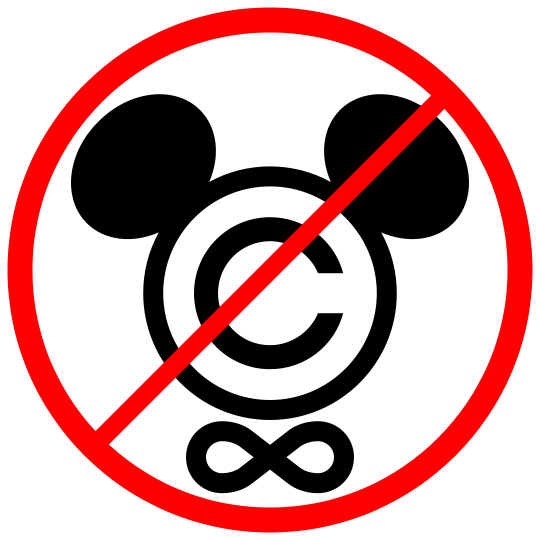How did Mickey Mouse change copyright?
On this Friday night, we want to tell you an interesting story about Mickey Mouse and copyright. With this note, we begin a rubric in which we will post short informative copyright notes every Friday.
Mickey Mouse as a copyright symbol.
The history of copyright law dates back more than 300 years. For three centuries, several acts have been passed, about which everyone has heard one way or another: the existence of the Bern Convention and the DMCA is known to many. Today we want to tell you about another law known to many, passed in the USA in 1998. This is the Copyright Term Extension Act ("The Law on the Extension of the Protection of Copyright"), popularly known as the Mickey Mouse Law.

')
Mickey Mouse was born in 1928. Officially, the birthday of the most famous cartoon character in the United States is November 18, 1928. It was on this day that the cartoon "Willie Steamer" was shown to the world. The rights to Mickey Mouse are owned by Disney, for which Mickey Mouse is one of the main assets: analysts estimate the cost of Mickey Mouse to be more than $ 3 billion. In 2000, Walt Disney’s monopoly on Mickey Mouse was supposed to end, and therefore the company began lobbying the law on extending the term of copyright protection.
At first, lobbyists demanded an eternal monopoly. But it turned out that the infinite term of copyright is contrary to the US Constitution. MPAA Chairman (Motion Picture Association of America - cartel of film and video publishing companies) Jack Valenti said on this occasion that in this case the term of the copyright should be an eternity minus one day.

After lengthy discussions, the Law passed the procedure and was adopted. By the way, Sonny Bono was one of the most active supporters of this bill: the first husband of the singer Cher, who was once a former musician, didn’t live a long time before the law was passed, and therefore the act was named in his honor - Sonny Bono Copyright Term Extension Act.
Total
The enacted Law increased the terms of copyright protection before the action during the author’s life and 70 years after his death, and for employment - up to 120 years after creation or 95 years after publication, depending on which date was earlier.
In 1999, book publisher Eric Eldred and lawyer Lawrence Lessig tried to challenge the constitutionality of the Law, relying on the First Amendment to the US Constitution. The lawsuit was slowly moving forward in instances and in October 2002 got into the Supreme Court. On January 15, 2003, the US Supreme Court, seven votes to two, denied the lawsuit.
How about us?
We have the work goes into the public domain 70 years after the death of the author, as in the United States. In general, the picture in the world is as follows:

picture - wikipedia
Here is such a story. Subscribe to our blog and next Friday learn how copyright and Hitler are related.
Mickey Mouse as a copyright symbol.
The history of copyright law dates back more than 300 years. For three centuries, several acts have been passed, about which everyone has heard one way or another: the existence of the Bern Convention and the DMCA is known to many. Today we want to tell you about another law known to many, passed in the USA in 1998. This is the Copyright Term Extension Act ("The Law on the Extension of the Protection of Copyright"), popularly known as the Mickey Mouse Law.

')
Mickey Mouse was born in 1928. Officially, the birthday of the most famous cartoon character in the United States is November 18, 1928. It was on this day that the cartoon "Willie Steamer" was shown to the world. The rights to Mickey Mouse are owned by Disney, for which Mickey Mouse is one of the main assets: analysts estimate the cost of Mickey Mouse to be more than $ 3 billion. In 2000, Walt Disney’s monopoly on Mickey Mouse was supposed to end, and therefore the company began lobbying the law on extending the term of copyright protection.
At first, lobbyists demanded an eternal monopoly. But it turned out that the infinite term of copyright is contrary to the US Constitution. MPAA Chairman (Motion Picture Association of America - cartel of film and video publishing companies) Jack Valenti said on this occasion that in this case the term of the copyright should be an eternity minus one day.

After lengthy discussions, the Law passed the procedure and was adopted. By the way, Sonny Bono was one of the most active supporters of this bill: the first husband of the singer Cher, who was once a former musician, didn’t live a long time before the law was passed, and therefore the act was named in his honor - Sonny Bono Copyright Term Extension Act.
Total
The enacted Law increased the terms of copyright protection before the action during the author’s life and 70 years after his death, and for employment - up to 120 years after creation or 95 years after publication, depending on which date was earlier.
In 1999, book publisher Eric Eldred and lawyer Lawrence Lessig tried to challenge the constitutionality of the Law, relying on the First Amendment to the US Constitution. The lawsuit was slowly moving forward in instances and in October 2002 got into the Supreme Court. On January 15, 2003, the US Supreme Court, seven votes to two, denied the lawsuit.
How about us?
We have the work goes into the public domain 70 years after the death of the author, as in the United States. In general, the picture in the world is as follows:

picture - wikipedia
Here is such a story. Subscribe to our blog and next Friday learn how copyright and Hitler are related.
Source: https://habr.com/ru/post/391865/
All Articles